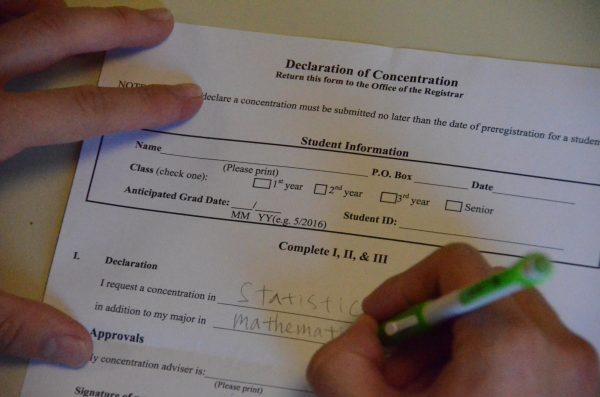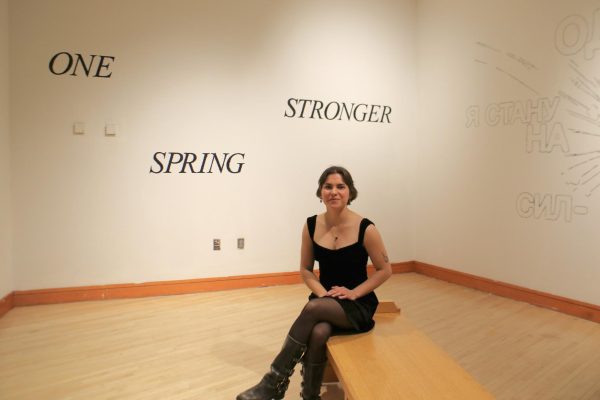Mental Musings: It’s time to speak our shame
Graphic by Hannah Agpoon.
October 14, 2022
When I tell people I have an eating disorder, they often look at me like I’ve just revealed that I have a third nipple. They knew these people existed but have never met someone actually willing to admit it (and I feel that I must now confess that I do in fact have three vestigial nipples). I can’t presume to know exactly why people are so surprised. Maybe they didn’t know eating disorders were so common or they just aren’t used to hearing that label used so openly. Maybe the latter results in the former.
I think many people are scared of labels because often we come to be defined by them, but this doesn’t always have to be the case. Yes, I am mentally ill, and yes, I speak about it openly — I even write a column about it. But anyone who knows me even a little bit would know I am more than just a sick person. I am a person who loves the color yellow and going out of her way to step on leaves to hear the crunch, a person who gets food on her face at every meal. I’m a friend and teammate and fierce advocate. I am also a person who can tell the people around me how I’m really doing because the fear of being labeled doesn’t bother me anymore.
Sometimes I forget how difficult vulnerability is because I have been practicing it for so long, but the truth is that it took me a long time to get comfortable with it too. I started going to therapy when I was 12, but it wasn’t until midway through college that I shared that information publicly. After residential treatment during my second year at Grinnell, I was done with making excuses, and I had enough information about the insidious nature of my disease to know that it wasn’t my fault. I felt secure enough in myself to not feel shame over my disorder. If others judged me, so be it.
I have been part of many mental health conversations across campus, usually for sports teams. Often when we discuss eating disorders, the conversation inevitably turns to being careful to not label anything when discussing concern for a teammate because it would be oh-so terrible to suspect someone of having an eating disorder if they didn’t. But would it really? Why is that so bad? I don’t think having a mental illness should be shameful. Wouldn’t it be better to ask if someone is really struggling and be wrong than not ask and be right? If you don’t want to share because it’s personal, I understand, but I don’t think that’s the case — shame is the underlying reason.
The unfortunate side effect of not using certain words and avoiding labels is that we end up having to tell subtle lies constantly. A big component of 12-step therapy (which is commonly used for alcohol and other addictions) is honesty. Obviously, when dealing with an addiction, honesty is crucial because one can’t be lying about their behaviors, but honesty does a lot more good for our overall well-being. Honesty helps us to heal, to feel whole. Honesty is the only way we can form genuine connections. When we tell half-truths, we are only really capable of half-relationships.
When I think about the mental health crisis we are in, it’s easy to see that a huge part of the problem is that we isolate our shame. We lie to almost everyone around us because we don’t want to burden them or feel ashamed or cause a fuss. So, we say we are stressed or tired, we say we have a lot on our plate, that we already have plans, that something came up. We want to say I’m depressed, I’m anxious, I’m having a panic attack, I can’t come because I need to take care of myself, because I have therapy. Sometimes there are words we are scared to say because we fear they hold too much weight, but not saying them aloud doesn’t make them any less real, and it distances us from everyone around us.
It shouldn’t be just on the people who have mental illness to normalize these labels either. Obviously, mislabeling isn’t good, but in this case, it might be better to make a mistake and apologize. I want to be clear though, I think that this should only be done when speaking to the person with whom you are concerned for. Labels should never become gossip. Period. Even if they are true. Period. A good rule of thumb is that we should never assume and always ask questions.
In Question, Persuade and Respond training, they teach you that the best way to deal with someone who you fear is suicidal is to ask them directly, “Are you feeling suicidal?” I can’t count the number of times I have been asked, both by mental health professionals and loved ones, “Do you feel like you want to hurt yourself?” The question isn’t meant to accuse or assail, it’s a question to show concern. If you suspect someone of being tired, you would ask, “Are you tired? Do you want to go to bed?” You wouldn’t beat around the bush; we would ask the person the most direct question to help them get to bed and get some sleep. We have developed a much broader vocabulary to talk about the complicated nature of our psyches. We have the language, and I think it’s time we use it.
Obviously, everyone has the right to choose whether they share or not, and for some people that might not be the right choice for a number of reasons. However, I worry that when people are really struggling, they don’t reach out not because it’s not the right choice, but because it is such an abnormal and stigmatized thing to do. Pushing against the norms takes a level of bravery and vulnerability that seriously hurting people don’t have the energy to access, which is exactly why it needs to be everyone’s job to push against these norms.
We talk about mental health on this campus, but it’s usually only the things we know everyone can relate to. We are afraid of actually talking about neurodivergence — the experiences that we know some people might not understand. We talk about stress and anxiety, and maybe sometimes depression, and that’s great, but we also need to be able to talk about the quantity of people on campus who are suicidal, who are anorexic, who are having absolute mental breakdowns. Doing so will both reinforce that these are shared experiences, making us feel less alone, but also push us towards a future where we can get help. We need to make sure these aren’t as common of experiences. Take away the power and shame from these words by speaking them.







































































